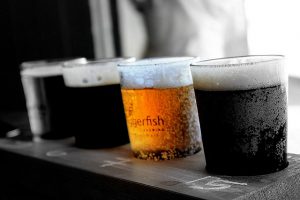Drinking alcohol with friends or family to relax can make for fun pastimes. However, just as with all hobbies, it should only be enjoyed in moderation. Repeating poor behaviors consistently can lead to forming unhealthy habits that hurt your quality of life. Long and recurring drinking sessions—often called “binge drinking”—is one of these.
There are various traits that can separate binge drinking from casual drinking. By knowing and identifying these symptoms, you, close friends, and family can avoid the traps of binge drinking.
The Causes of Binge Drinking
People will casually drink for a variety of reasons: to relax, have fun, relieve stress, or party with friends. Problematic drinking can connect to these reasons, but has its own causes as well. At parties, many people begin to binge drink to fit in or ease social anxiety.
While drinking at a fun occasion isn’t inherently wrong, it becomes a problem if it happens on a regular basis. Motivations that indicate a drinking problem include numbing negative emotion, self-medicating, or becoming dangerously drunk. Binge drinking may also be used as a coping mechanism and is common for people with mental disorders such as anxiety and depression.
Short-Term Effects
Heavy binge drinking can cause both short-term and long-term physical and mental side effects. Physical short-term effects can include:
- Dehydration
- Dizziness
- Vomiting
- Clumsiness
- Drowsiness
- Irregular Heartbeat
- Lack of response
Heavy binge drinking can make you legitimately ill, and at times, it can be potentially life-threatening. Binge drinking creates similar symptoms with mental side effects, such as depression, confusion, aggression, memory loss, and impaired judgment.
These effects can not only make it harder to focus or do tasks but tempt risky behavior in the person drinking. Such behaviors include sexual misconduct or criminal activity and open the door for entirely new problems other than drinking.
Long-Term Effects
While short-term problems can typically be solved with overnight recovery and avoiding binge drinking altogether, long-term effects are more complicated. With long-term symptoms, drinkers may have to consider therapy depending on the severity of symptoms. For worst-case scenarios, they may even need medical attention.
These effects can be both direct and indirect to binge drinking itself. Direct symptoms can include depression, nerve damage, hypertension, liver or heart disease, and memory or learning problems. Indirect problems include STDs from sex while intoxicated, inability to keep a job or stay in school, and various cancers.

If you or a loved one is struggling with drug or alcohol addiction, contact a local Treatment & Rehab alternative in Tennessee. You might be interested in Discovery Place’s own treatment center alternatives, such as our 30 Day Residential Addiction Alternative Recovery Program or our Long Term Alternative Recovery Program in Burns, Tennessee. Call us for a free consultation at 1-800-725-0922.

